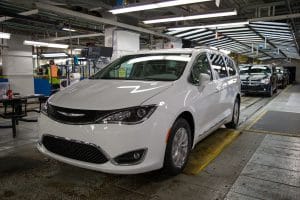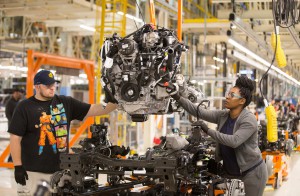Fiat Chrysler and Honda have announced tentative plans to resume U.S. production during the first week of May, though these dates will depend upon expectations that the coronavirus pandemic will be largely brought under control by then.
Production across North America came to a screeching halt in mid-March as the outbreak spread across the country and workers at numerous auto plants were diagnosed with COVID-19, the disease caused by the novel coronavirus. Most manufacturers, including Ford, FCA, General Motors, Toyota and Honda originally had hoped to resume operations by the end of March but extended their shutdowns when the pandemic accelerated.
“FCA continues to make the health and well-being of its employees a top priority,” the smallest of the Detroit automakers said in a Monday afternoon statement. “With that in mind, FCA intends to progressively restart its U.S. and Canadian manufacturing facilities beginning May 4. The status of production at FCA’s Mexico operations will be the subject of a separate announcement.”
(Nissan, Volkswagen extends shutdowns at U.S. plants.)
Honda, meanwhile, issued a statement that said it is “extending the production suspension previously announced for all of its automobile, engine and transmission plants in the U.S. and Canada through May 1.” The Japanese automaker’s shutdown began on March 23.
Several other automakers, including Toyota and General Motors, said they were not ready to lay out plans to resume production, though sources at the Japanese automaker indicated an announcement could come later this week.

Fiat Chrysler is hoping to restart its U.S. and Canadian operations, like the Windsor, Ontario plant that builds its Chrysler Pacifica minivan.
As for GM, “We are actively monitoring the situation, and when it is determined that we can safely resume regular production, we will,” the company said in a statement.
Initially, most manufacturers hoped to get production ramping back up by March 31. But, by the end of the month, it became clear that date was unworkable. Facing pressure from President Donald Trump to help kick start a stumbling economy, some automakers then announced a target in mid-April. Ford proposed a relaunch of operations at its Hermosillo, Mexico assembly plant on April 6, with four others to follow a week later.
Within days, those new schedules were scrubbed, as well. Ford, for one, reported two deaths at plants in Michigan from COVID-19, with a growing number of workers either showing signs of illness or diagnosed with COVID-19.
Whether manufacturers can even hold to the latest schedule is far from certain. The White House now suggests the peak of infections – and of subsequent fatalities – will come in about two weeks. But whether that means things will reach a level where it is safe to bring thousands of workers into close proximity at car plants by early May is far from certain. Even one person infected with the coronavirus but showing no symptoms could rapidly spread the disease throughout a factory, experts have warned.
(Ford agains delays production restart; others likely to follow.)
Several U.S. car plants have reopened – or will shortly – albeit on a limited scale. These include a Ford factory in Ypsilanti, Michigan, and a GM plant in Kokomo, Indiana, both set to produce desperately needed ventilators. Those on the job have volunteered and the automakers are taking numerous steps to reduce the risk of infection at those facilities.

FCA employees may return to plants in early May, but that’s dependent upon the status of the pandemic.
The shutdown of production has generated billions of dollars in losses, according to industry analysts, but it has not necessarily been as big a hit as it might have been in more normal times, said Tyson Jominy, a senior analyst with J.D. Power, because U.S. dealer inventories have been overflowing with unsold vehicles. Sales for March tumbled nearly 40% and Power forecasts April demand will slide by 80% year-over-year. Some markets already are off nearly 100%, Jominy noted, including Michigan, the site of one of the country’s largest coronavirus outbreaks.
Power and other research firms expect demand to remain seriously depressed through at least June, while rebounding only modestly the rest of the year. Sales could tumble as low as 12 million for all of 2020, approaching levels not seen since the low point of the Great Recession, warned Jeff Schuster, lead analyst with LMC Automotive, during a web conference sponsored by the Detroit Automotive Press Association.
“We anticipate demand for vehicles in the second half of the year will be depressed by 10 to 30% so demand will not be restored to pre-virus levels until at least next year,” said Power’s chief data officer, Thomas King, during a separate media webcast.
TheDetroitBureau.com has reached out to the United Auto Workers union for comment on the latest production plans and will update this story when it responds.
Production was stopped in February in most of China, where the coronavirus first hit. Many plants have now reopened, though production is far from back up to normal, according to Michael Dunne, founder of Asian automotive consulting firm ZoZoGo.
(Detroit automakers temporarily shutter North American production – our original report.)
Europe is largely shut down as well. Ford now says it hopes to restart “most” of its operations on the continent early in May.

